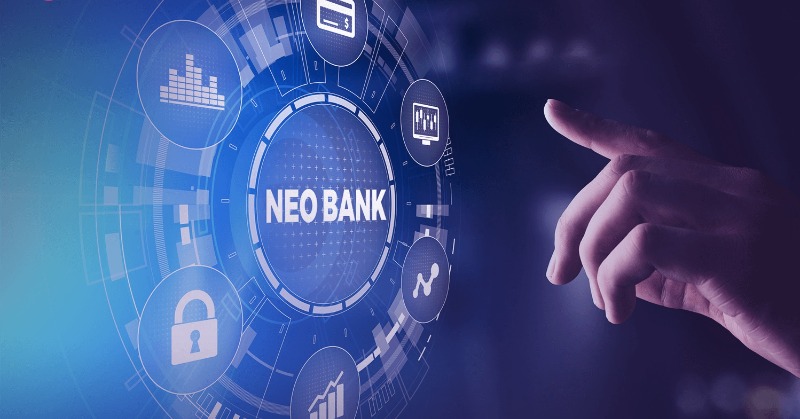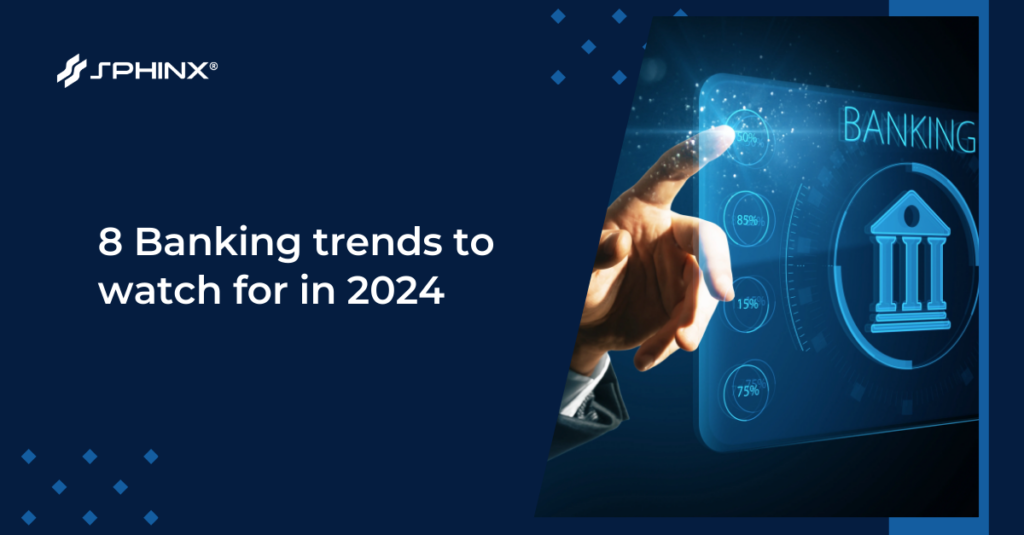Technological advancements, rising client demands, and increasing regulatory frameworks are all having a big impact on the banking and financial services industry. Future developments in the digital banking sector will bring about a transformation in the banking and finance environment due to innovation.
So what trends in the financial sector are worth paying attention to in 2024? Join Sphinx to learn about the upcoming trends in the banking sector.
1. What banking trends to watch in 2024?
It will be necessary to create a new pace in the banking industry in 2024 rather than merely keeping up.
The field of creative AI is rapidly progressing. It is obvious that flexibility is a requirement given the increasing use of cloud computing and the rising difficulties in embedded finance and cybersecurity.
It is critical for financial organizations to adopt strategies that handle present difficulties while also considering future demands. The following eight cutting-edge developments might influence the financial scene in 2024.
1.1. Artificial Intelligence (AI)

One of the trendiest subjects in technology right now is artificial intelligence. AI technologies such as chatbots, handle inquiries quickly, whilst biometric solutions improve security and expedite AML (Anti-Money Laundering) and KYC procedures.
Artificial Intelligence (AI) has become a major force behind the change of banking, whether it is by optimizing document processing using computer vision or applying machine learning to improve lending and investing choices.
1.2. Neobanks
Neobanks, sometimes referred to as alternative banks or online banks, are upending the financial industry. These cutting-edge financial companies only conduct business online and provide a comprehensive variety of banking services without any requirement for physical locations. Neobank is becoming more and more well-known due to its simple account opening process, inexpensive fees, and user-friendly layout.

1.3. Network security guaranteed
Network security and the protection of data warehouses are important priorities for banks. To fend against attacks, proprietary protocols, encryption engines, and AI-powered fraud detection systems are used.
Furthermore, the bank’s defensive capabilities are strengthened by the deployment of anti-hacking software, which guarantees data integrity and consumer confidence. The banking industry must modify their reaction as attackers increasingly use new technology, such as artificial intelligence.

1.4. Open Banking
Open banking facilitates the establishment of relationships between non-banking financial businesses (NBFCs) and traditional banks. Banking APIs allow other developers to safely access data, promoting innovations including embedded banking. The rise of banking as a service (BaaS) gives banks additional avenues for income generation and increases their market penetration.

1.5. Migrate services to the cloud
Banking institutions may now be more flexible and scalable thanks to the shift to cloud computing. Banks can react swiftly to changes in the market, spur innovation, and better handle the ever-changing needs of their customers by utilizing the cloud’s adaptability.
Furthermore, in the event that a single static server fails, this method offers protection against any disruptions or safety risks.
1.6. API-centric system
The implementation of Application Programming Interfaces (APIs) is transforming the banking industry. Banks are enabling companies to create customized financial solutions for their clients by giving up their systems and data via application programming interfaces (APIs). Businesses may improve client satisfaction and loyalty by providing a range of financial services straight through their applications.
Additionally fostering development in the financial sector, the API-centric environment makes it easier for banks and startups to collaborate. Without requiring significant internal development, banks may increase the range of services they provide, which shortens time to market and lowers costs.
1.7. Automate banking processes
A number of banking activities are made simpler by banking process automation (BPA). RPA improves the productivity of processes like invoicing receipt and payment authorization.
This automation ensures quicker answers, better compliance, and data-driven insights for tasks like payment card identification and loan processing.
1.8. Expanding banking as a service (BaaS)
As banking as a service gains traction, it becomes easier to incorporate banking and financial services into the digital platforms of conventional financial institutions as well as non-financial businesses.
Non-financial firms, such as trading businesses, have the ability to offer services like dealing with payments, mortgages, and savings accounts, which may increase client loyalty and produce additional income streams. Additionally, BaaS gives fintech and entrepreneurs a platform to swiftly launch novel financial products, boosting their venture capital endeavors.
BaaS provides traditional banks with an avenue to broaden their client base and increase market share. Banks may broaden their range of services, boost competition, and establish a more dynamic and customer-focused banking environment by forming partnerships with non-financial companies.
Conclusion
As the financial sector changes, the significance of responding to digital technologies and maintaining good cybersecurity becomes increasingly clear. Sphinx aims to provide banks with the necessary resources and know-how to be viable and appropriate in a financial landscape that is undergoing fast change. It will achieve this via providing cutting-edge technological services, tailored approaches, and unparalleled industry leadership.




CEO - Son Le
OTHER BLOGS
Blogs
Top 15 HRM Software for Effective HR Management 2026
In 2026, Human Resource Management expands beyond payroll processing and employee record keeping to play a strategic role in business growth. Modern HR teams are expected to drive talent strategy, enhance employee experience, ensure regulatory compliance, and deliver workforce insights that directly support business growth. As organizations become more digital...
Read MoreBlogs
AI Automation: How It Works, Benefits, and Best Practices
As organizations face increasing operational complexity, traditional automation alone is no longer sufficient to sustain efficiency and competitiveness. Businesses today require systems that not only execute predefined tasks but also learn, adapt, and make intelligent decisions. This shift has positioned AI Automation as a transformative force, enabling enterprises to automate...
Read MoreBlogs
App Design for 2026: Trends, Techniques, and Tools
As digital products become more deeply embedded in everyday life and enterprise operations, app design in 2026 is no longer about visual appeal alone. It is a strategic discipline that combines user psychology, business objectives, platform capabilities, and emerging technologies. Modern app design must anticipate user intent, adapt to contextual...
Read MoreOTHER BLOGS
Our Sevices
IoT Development
SphinX offers cutting-edge IoT development services, seamlessly connecting devices and providing innovative solutions for a...
Xem thêmOur Sevices
Blockchain Development
We are highly proficient in engineering reliable and secure blockchain technologies from the ground up,...
Xem thêmOur Sevices
ERP & CRM Development
ERP & CRM development services that you need! Streamline business processes and enhance organizational efficiency....
Xem thêmOTHER BLOGS
Our Sevices
IoT Development
SphinX offers cutting-edge IoT development services, seamlessly connecting devices and providing innovative solutions for a...
Xem thêmOur Sevices
Blockchain Development
We are highly proficient in engineering reliable and secure blockchain technologies from the ground up,...
Xem thêmOur Sevices
ERP & CRM Development
ERP & CRM development services that you need! Streamline business processes and enhance organizational efficiency....
Xem thêm